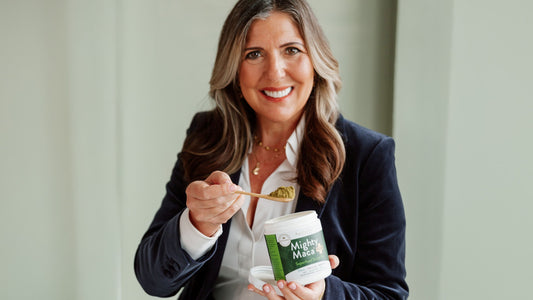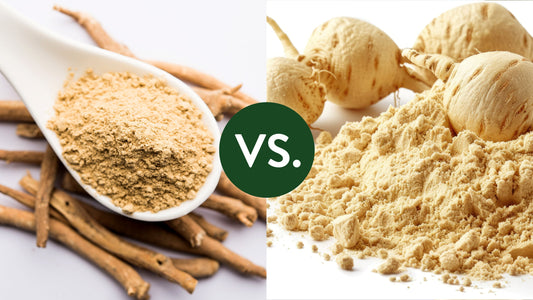Myths about menopause are everywhere. And the fact that we’re still hearing a lot of incorrect information about menopause regularly tells me that we still have a ways to go when it comes to educating everyone about this transition.
Which is why I’m writing this article. From hot flashes to mental health, menopause can be brutal. Adding misinformation to the mix isn’t helping anyone.
In fact, myths about menopause keep women from getting the help they need during this potentially difficult time. Allow me to set the record straight about menopause and the stigma surrounding the whole process.
1. You Have To Suffer Through The Menopause Process
The number one menopause myth I want to bust is that you just have to suffer through menopause. It’s so unfortunate that women have gotten this message over the years. But let me be perfectly clear. Menopause is mandatory. Suffering is optional.
You have so many tools at your disposal to help manage your menopause experience. Please, please, please, do not buy into this myth that menopause is just this horrible time in your life and you have to endure it and then when you come out on the other side, you’ll be this little old lady. Menopause can be a wonderful and beautiful experience — without all of the symptoms that typically come with it.
2. You Just Need To Have A Glass Of Wine And Relax
Let’s say you’ve been suffering from vaginal dryness, anxiety, poor sleep, hair loss, and fatigue. You finally schedule some time off, drive across town, and see your doctor. The doc just shakes his head, shrugs, says “That’s all just normal!” and suggests you go home, have a glass of wine, and relax.
This is not acceptable.
Unfortunately, most doctors, even OB/GYNs, do not get much training about menopause in medical school. By some accounts, fewer than 1 in 5 gynecologists receive training regarding menopause! (1) And while that desperately needs to change, in the meantime — if you don’t get answers from your regular doctor, please seek out a second opinion. You do not have to accept feeling less than 100% yourself just because you’re going through a hormonal change.
3. Menopause Is A Long, Drawn-Out Process
Did you know that “menopause” is technically only one day of your life? Yep, menopause is the term that refers to the one-year anniversary of your period disappearing. Technically, the time before that day is referred to as “perimenopause” and the time after that day is “postmenopause.”
However, most women typically use the term menopause to refer to the whole transitional phase, from perimenopause through postmenopause.
No matter what you call it, menopause does not have to be torture. When you support your hormones and your body the right way, it can be a smooth transition without much mayhem.
4. Menopause Automatically Starts At Age 50
Many women believe that menopause and all the symptoms that come along with it just automatically start at age 50. This is not true for most women. In fact, some women begin to notice signs of menopause in their 30s. And many women start feeling the effects of waning sex hormones in their 40s.
The process of menopause can last many years, and the changes are often gradual. Menopause isn’t typically like the flip of a switch. It’s usually more of a process. Of course, if you have a hysterectomy, menopause can come on quite quickly and will start as soon as you have your surgery.
5. Only The Most Horrific Menopause Symptoms Need Treatment
Many women have heard the horrors of menopausal hot flashes. They’ve heard women complain about being in the middle of a store and suddenly, they feel like they’re on fire — dripping sweat and unable to do anything about it.
So they wait for something catastrophic like that to happen before they seek answers.
Please, don’t do this.
Hormones are easier to balance when they are only slightly off-kilter. You don’t need to wait until you are completely miserable to get help. Noticing a little dryness or itching down there? Feel just a bit more tired than you usually do? Start supporting your hormones now — before things get out of hand.
6. You Can Get Pregnant In Menopause
This seems to be a question that a ton of women have, and I’m here to clarify things for you.
If you are still ovulating (for example, during perimenopause) you can still get pregnant. It might be harder for you to get pregnant during perimenopause because ovulation can be erratic during these years…but, you can get pregnant. That means if you do not want to get pregnant, you should use some form of birth control.
If you are not ovulating, and you haven’t had your period for more than a year (which means you’re officially postmenopausal), you cannot get pregnant.
7. Menopause Doesn’t Affect Your Mental Health
We don’t talk about the effects that changing hormone levels have on your mental health nearly enough. Just know that if you have noticed heightened feelings of depression or anxiety during the menopausal transition — it could be your hormones.
Studies suggest the incidence of anxiety and depression is higher in women during menopause…and that’s not just for women who have already experienced mental health challenges. (2-5)
Plus, dealing with mood swings, brain fog, low energy, your hair falling out, and leaking pee every time you sneeze can also affect your mental health.
8. Hot Flashes Are Not That Big Of A Deal
A lot of times, women are taught that their menopause symptoms are just no big deal. Hot flashes? How bad can those really be?
But here’s the thing. Maybe a few women experience hot flashes as an isolated symptom of menopause. But most of us have a whole cluster of symptoms that can range from weight gain to leaky bladder to depression. These are all serious things that seriously affect your health and your quality of life. They are not simply symptoms to be dismissed and brushed off.
Plus, even something like a hot flash can spell serious discomfort and take a toll on your health. For example, when hot flashes happen in the middle of the night, it can mean a major interruption in sleep — which again has serious consequences for your health.
Bottom line, instead of dismissing women’s suffering, let’s be more supportive and acknowledge just how difficult this time can be.
9. Once You Hit Menopause, Your Sex Life Is Over
I hear this menopause myth often. Both women and men commonly seem to believe that once you’re menopausal, your sex life is done for. And I promise, that’s not the truth. You can have a thriving intimate relationship with your partner, even in menopause.
Yes, the vaginal dryness that shows up in menopause can put a damper on things, and your lack of libido may make things difficult…but, it is possible to restore both with the right combination of support.
10. Menopause Looks The Same For Every Woman
Menopause, perimenopause, and postmenopause can look very different in every woman. There are some symptoms that some women have a terrible time with, and other women just don’t experience them.
That means we have to be patient with others and believe them even if our experience differs from theirs. We can all use an extra dose of oxytocin at all times, but especially during the menopausal transition…so please, be kind.
Busting Myths About Menopause
Have you heard these myths about menopause before? Have you been suffering in silence, thinking that this is just how things are from now on?
Then it’s time you met the Ultimate Menopause Myth Buster: The Menopause Kit.
This special collection of my most popular products tackles menopause from every angle. It supports your hormones in a way that makes this whole menopausal transition feel way less frightening and much more empowered.
That’s right, I’ve combined the power of Julva®, Balance, and Mighty Maca® capsules into one easy-to-use package.
This combination can help make you:
- Feel juicier down there
- Boost your desire in the bedroom
- Stop dribbling when you sneeze
- Much more energetic
- Sleep like a baby
- Forget about hot flashes
Learn more about the Menopause Kit here.



